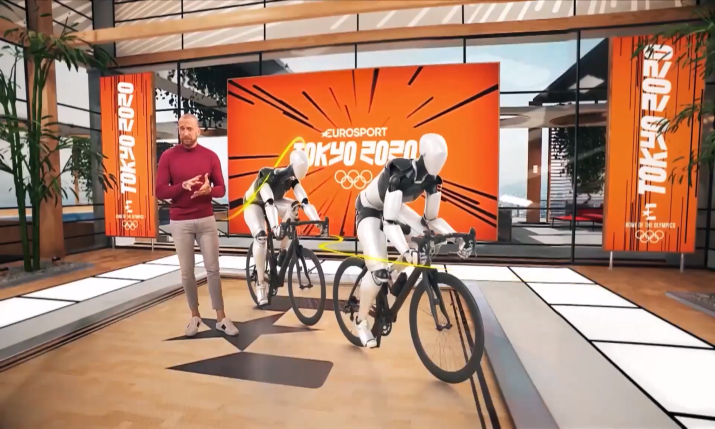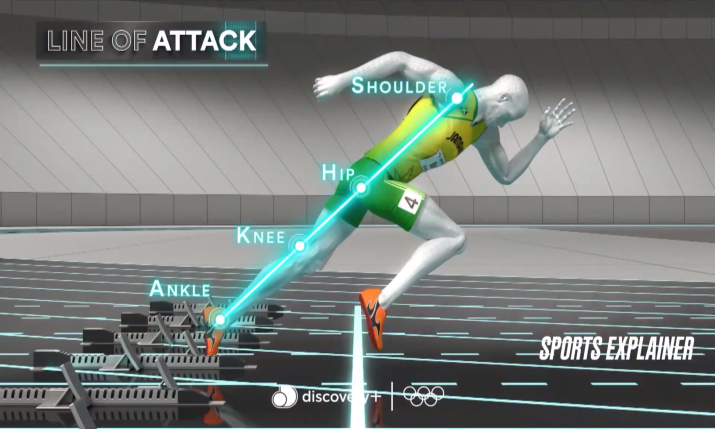Digital, local, personal: Discovery outlines grand plan for Tokyo Olympic Games broadcast coverage

Discovery is set to bring the Tokyo Olympics to Europe from its new-look Cube
Discovery has outlined its European broadcast plans for the Tokyo Olympics, which marks its first ever Summer Games for the International Olympic Committee (IOC).
From its linear channels including Eurosport, to a personalised experience on Discovery Plus, social media offerings and the new enhanced Cube – read more about the Cube here – the broadcaster is hoping to make this the most viewed Summer Olympics in Europe, ever.
Andrew Georgiou, president of sports at Discovery, states: “The IOC and the organising committee in Japan and the Japanese people have had a really long journey, but we’re at the doorstep of the world’s biggest event. And we’re really excited; the athletes have been preparing, they’ve been training, the athletes are ready, the venues are ready and we’re ready.
“The Olympics provides an awesome canvas to tell some great stories and we don’t know what those stories are going to be yet, and that’s part of the excitement. We’re certainly planning to tell those stories and we have a great opportunity to do so,” he says.

All Discovery content will be available across a number of channels, from linear TV to Discovery Plus for a personalised experience, a UHD channel, and social media. British cycling champion and on-screen talent, Bradley Wiggins is shown here in the Cube using its new analytics powers
Bold ambition
“We definitely want to make sure that these Summer Games are viewed by more people across Europe than any Summer Games in history,” continues Georgiou. “That’s a bold ambition and I think we’re going to achieve that, and one of the reasons we can achieve that is because we’ve got a really big breadth of coverage and Discovery’s coverage of the games, in addition to all the local national broadcasters, means Discovery, Discovery Plus, and Eurosport are the only places right across Europe where you can watch every unmissable moment and that’s going to make us a real destination.
“It means that people can see it across all of our digital platforms. That means they can see it when they want, they can watch it where they want, on any device they want. And that’s a Discovery selling point for sure,” he says.
“We’ll be using all of our platforms, both paid, owned and operated platforms, to point people to Discovery Plus as being the best place to enjoy the Olympics, because it will be the only place in each of those markets where you’ll be able to get everything”
As to the challenges of the current global pandemic situation, and the fact the Japanese government recently announced a state of crisis in the country, Scott Young, Discovery’s senior vice president of content and production who spoke to SVG Europe from the IOC IBC in Tokyo, says: “That’s a huge complexity that we’re dealing with and we’re dealing with the changes of that every day. Every day we sit down with OBS and the other key broadcasters that are here and work through the changes that are still unfolding in front of us.”
Georgiou states: “Discovery is pretty excited about the games, our first summer Olympics. We’re really looking forward to it. We thought we were going to do it last year, of course, but we’re excited. There’s been loads of challenges in terms of getting people on the ground, and we’ve certainly adjusted our production plans in terms of meeting some of the hurdles and some of those challenges, and being respectful of the folks in Japan as well. So there’s been lots to do despite having an extra 12 months to do it, because kind of everything has changed. It’s difficult to know what to expect.
“I’m leaving on Saturday for Tokyo so I’m fascinated to see what it’s going to be like on the ground during a quite unique Olympic moment.”

The new-look Discovery Cube is set to blow minds, from incorporating the weather in Tokyo that day, to showing the spectacular Tokyo skyline, and following the Japanese clock with night to day effects
Storytelling expertise
On how Discovery is going to attract those viewers, Young comments: “It comes down to storytelling. We’re here for the athlete’s journey and we want to live every moment of that. To do that we’ve amassed the most impressive broadcasting team I’ve seen; we’ve got over 150 talented presenters and athletes and experts; that’s totalling 198 Olympic appearances, 84 medals in total, 30 of those gold.
“So that’s an extraordinary amount of depth and breadth of we’re going to bring you across our markets,” Young continues. “That’s topped up with 400 commentators who be commentating just over 6,300 sessions, so you won’t miss the Olympics across what we’re doing and we’ve got teams out in venues, beaming back into their home base here in Tokyo, that then is fed directly back into their markets back at home. So our content is going to be immersive and the storytelling is going to be magnificent.”
Young comments on the size of Discovery’s operation from Japan to Europe: “The scale of our project is enormous, not just in what we’re doing here in Tokyo, but how we broadcast back across Europe. Traditionally, our content is seen by about 130 million people each month. We have our linear channels, we’ve got our subscription channels, we’ve also got our Discovery Plus channels and .com channels and the Eurosport Player.
“How we send content around our platforms and our market across Europe is unlike any other broadcaster,” Young continues. “We are the most complex sports broadcaster in the world, and we have 50 markets across 19 languages. We have an extraordinary depth and breadth of storytelling ability and from the group that are here – and we have hundreds of people here on site – and thousands of people back across Europe, to connect this content across our markets.
“So from the technical operations hub, which is just outside the door here [in Japan at] our location at the IBC, we’ll send 164 feeds back to our centres in London and Paris, before we distribute those to our 11 broadcast markets [and] 44 of those feeds are UHD to be able to watch the Olympics in extraordinary colour and the HD experience [is] equally as good.”
The UHD feeds will be used for a linear Discovery 4K channel with commentary available in a choice of 12 languages.
Young says Discovery will have content for every viewer: “From leaning back in our curated channels and our talented teams, just telling the Olympic story with the key moments, right through to our pop-up channels, which are themed to your favourite sport, or through to the 56 channels where you can dive right in and be immersed into every moment that you want to watch uninterrupted commercial-free with the very best commentators we can find; it’s going to be an extraordinary experience,” Young says.
Ramped up coverage
Georgiou states that Discovery has ramped up its digital output for Tokyo versus Pyeongchang. “We’ve got a very different digital context to what we had in Pyeongchang, especially with Discovery Plus and bringing a broader audience onto [that platform] where we’ve got not just sport, but an entertainment and sports product [that] is very different to Eurosport, which is just a sports product. Being able to tell broader stories, because you’ve got a broader audience on a product which has more than just sport, opens up the opportunity bring new people into our universe, but also keep them in there longer because there’s more to enjoy.”
Georgiou says Discovery Plus is set to be a destination for fans over the duration of the Olympics, following its launch earlier this year. “Discovery Plus is our number one priority as a business at the moment. [It’s launch] has it been a watershed moment for the Discovery company, there’s no doubt. Everyone’s aware that this is our number one strategic priority, so in the markets where Discovery Plus is launched – we’re talking Finland, Sweden, Norway, Denmark, the Netherlands, the UK and Italy – Discovery Plus is our primary destination for all the sports fans.
“We’ll be using all of our platforms, both paid, owned and operated platforms, to point people to Discovery Plus as being the best place to enjoy the Olympics, because it will be the only place in each of those markets where you’ll be able to get everything,” Georgiou goes on.
Discovery Plus is going to make this Olympics a personised one for European fans, Georgiou states: “The idea that Discovery Plus allows a sport fan to choose what they watch, when they want to watch it, is valuable. A bunch of fans can take a curated experience; they’ll want the storytelling of a live channel and they’ll be able to enjoy Eurosport One and Eurosport Two and the pop-up channels through to Eurosport Nine that we’ll have. We’ll have a curated experience for people that want to have a story told to them and a narrative told them, but there are other people who might be rowing fans or cycling fans or fencing fans, or want to see the surfing because it’s new, and it might be on one of our platforms at that particular moment in time, but Discovery Plus allows them to choose, to visit that sport and enjoy that sport in a context where it’s their choice to do it.”

New analytics capabilities from Discovery will be ready at the start of the Games for six or seven specific sports
Social media push
On social media, Discovery recently launched a partnership with YouTube and has a partnership with Twitter and Snap already. It will be publishing content across these platforms to help it achieve its ambition of making this the highest viewed summer Olympic Games ever in Europe.
With YouTube, this week the broadcaster announced that its Eurosport YouTube Channel will host regular clips during the Games, including on-demand highlights, daily recaps and athlete spotlights. It will also present live streamed simulcast coverage of the Tokyo 2020 Opening and Closing Ceremonies.
Georgiou comments on social media: “If you think about our platforms and how they compliment the national broadcasters’ or our own commercial free to air networks in some markets where we’re covering the games ourselves, the opportunity [is] to actually think about the different demographic of audience and where they like to consume, and how we then might tease them back onto our own platform.
“Working with these social partners I think does give us access to an audience which is different to the kind of audiences we traditionally get to, and I think we can certainly give them a taste of the Games and certainly entice them back onto our platforms to see more of what we can provide them,” continues Georgiou. “So I think the social partners are fundamentally important.”
Content intense
Georgiou says the broadcaster has moved its strategy onwards and upwards since South Korea, where it first launched the Cube: “The focus on content this time around has been even more intense [than PyeongChang] and using our talents around creating great content has been a much bigger focus than at Pyeongchang.”
One of those focuses on great content outside of the new-look Cube is about following life at the Games for athletes. In Pyeongchang, Discovery had a three-camera team embedded in the German National Olympic Committee (NOC) house where it was able to engage with the team members in a full immersive way every evening, telling their stories for the German-speaking market. While this year it is not possible for Discovery to have that level of interaction with the teams in Tokyo, instead it is installing remote cameras in specific NOC houses, “so we can engage directly with the athletes without needing to actually walk into their bubble,” explains Young.
He adds: “OBS has been working very quickly and quite cleverly on how to create fan engagement for those who can’t attend Tokyo. So obviously it’s quite challenging to get into the country at the moment and without an accreditation it’s not possible, so they’ve created a virtual fan engagement site where you can actually upload messages to your favourite team or athlete and those messages will be seen as part of some of the broadcasts and sent back as part of the Olympic coverage. We can also capture some of those messages and embed those through our own digital product as well.
“So there’s going to be a very unique aspect of fan engagement has been brought around by COVID,” young goes on. “But I think hopefully it’s here to stay for many Olympics because it means that some five billion people who they estimate are going to be watching the Olympics in nine days’ time can also, through their own technology, engage in the Games themselves. So I think it’s a very unique launchpad.”
The IOC refugee team is a big focus for Discovery in Tokyo. It intends to make the team every European’s team. Georgiou explains: “The [Discovery] home crowd initiative again is different; it’s in keeping with trying to really create a narrative around a European context, as opposed to a series of national contexts. But the home crowd gives every European country the chance to support a team [the refugee team] that might otherwise not get much support, because that’s the whole point of the IOC refugee team. They’re displaced people and getting that European narrative across all of our platforms gives us a thread that is different to all the national broadcasters that we can then start to bring to life.
“If we can get 80 million or a hundred million people around Europe showing outward support on social and our platforms for the IOC refugee programme, that’s another initiative that tries to tie into all of our Eurosport context,” Georgiou concludes.
Tokyo 2020 starts on Friday 23 July 2021 and finishes on Sunday 8 Aug 2021.

